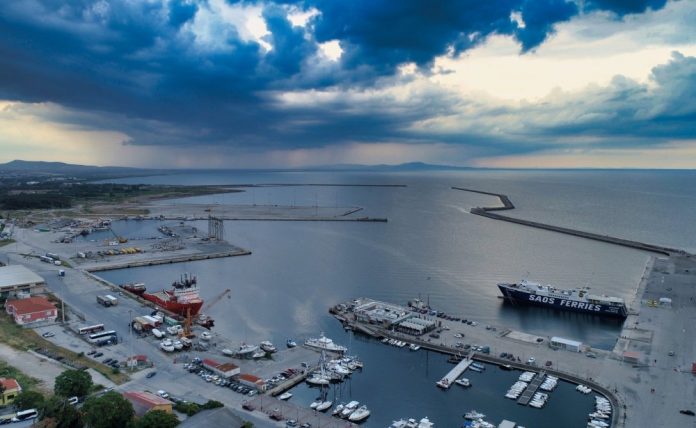Government-linked Turkish media have indicated concern about a series of visits and events in Greece’s Evros prefecture — the Greek-Turkish border region — which demonstrate a high level of US interest in the region and also communicate to the worried Turks that arch-rival Greece’s “star” continues rising in Washington, at least in strategic terms.
Burns’ “secret visit” to the Evros region
First among these visits was the travel to Alexandroupolis and the Evros prefecture by the head of the Central Intelligence Agency William Burns on June 1 after an unpublicized stop and meetings in Athens. While Burns’ visit to the country was not of major significance since Greece is being run by a caretaker government between the May and June elections, the fact that Burns’ stop in Northern Greece was commented on extensively by Turkish government-linked media outlets was rapidly picked up by Greek correspondents in Turkey and replayed with amplification into the Greek media bubble.
Greek media picked up heavily on Turkish media assertions that Burns’ support team from the US Embassy and the CIA itself had not notified local police or other authorities of the high-level visit to Evros prefecture, a rather outlandish claim that will be difficult to refute in any case.
Burns visited the Greek-Turkish frontier area mostly along the Evros River which has been battling a huge increase in refugee transits for some time. That by itself is of concern to Greece watchers because of a controversial (Trump-style) border wall under construction along the frontier, but this would generally involve a different set of US officials concerned with EU policy deliberations regarding regional migration issues and refugee flows. On matters related to Burns’ operational responsibility, there have been occasional attempts to infiltrate intelligence operatives into Europe as refugees via the Evros route, among other potential methods.
Because the strategic significance of Alexandroupolis has risen so dramatically since the start of the Ukraine war in February 2022, a visit to the facilities in that city combined with the Evros frontier issue made it reasonable for the CIA Director to invest an extra day in Greece. Good luck convincing the Turks this simple explanation was the truth.
Burns’ visit followed a steady flow of mid-level US officials to the city concerned both with military logistics and strategic energy issues, including senior elements of Secretary of State Antony Blinken’s entourage who broke away from a series of bilateral meetings in Athens last February to visit the port, partially upgraded with US support and local officials.
On top of the official visits, Alexandroupolis since mid-2022 has become the new must-see destination for all private sector, academic, and think tank “political tourists” traveling to Greece, especially those involved in Greek American relations, energy, and organizing expensive conferences on geopolitics, logistics or broader issues involving Southeast Europe.
Nothing really new
So while the state-linked Turkish media drones on about US plans to build permanent military facilities in Alexandroupolis, as they have for several years, there is little evidence from the Burns visit that Washington is changing its current strategy of using Alexandroupolis as a secure transit point for units/personnel/equipment flowing into the various NATO battlegroups in SE Europe in support of Ukraine. All US personnel in the Evros region are there on temporary deployments, and most transit the region in a matter of days or even hours.
Multilateral ambassadorial expedition
A second diplomatic initiative — which was not unilaterally American — has also worried the Turkish media enough to issue nervous reports about possible sinister long-term implications of such activity which some interpret as an element of a US master plan to bypass the Bosporus.
On June 2, the day after Burns departed, a select group of Black Sea country ambassadors based in Athens visited Alexandroupolis; the focus was as much on the strategic significance of the port of Alexandroupolis as the energy flows across the region. Ambassadors from Moldova, Ukraine, Romania, and Bulgaria joined US Ambassador John Tsunis on this visit; this timing probably explains why Tsunis did not accompany CIA Director Burns the day before.
Both the transport axis north from Alexandroupolis and the web of energy interconnectors and LNG hubs crisscrossing the region, some still under construction, were the focus of this initial group trip. For once following the talking points crafted by his knowledgeable embassy staff, US Ambassador Tsunis’ remarks focused on the “vertical axis” leading north from Alexandroupolis which is of deep strategic significance to all countries involved, especially Ukraine.
We expect there will be much more talk about the development of this “vertical axis” as a major new corridor for the region, some of which has already received EU funding. It is easy to understand why some in Ankara might read more into this concept than the organizers have in mind.
A second ambassadorial group visit to Alexandropoulis has been promised, something the local business community is eagerly awaiting as they were largely left out of the June 2 survey trip which focused on politically oriented meetings as well as the state-owned Alexandroupolis Port Authority, which should eventually be returned to the privatization process after being put on hold last year.








